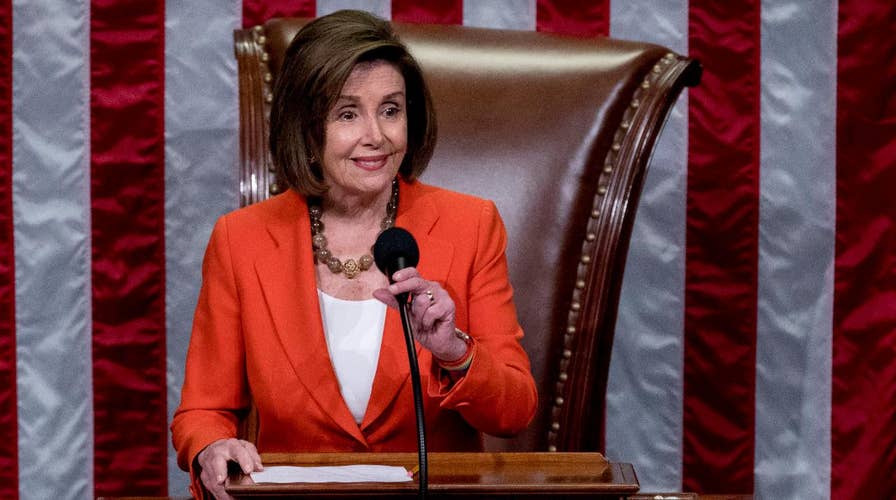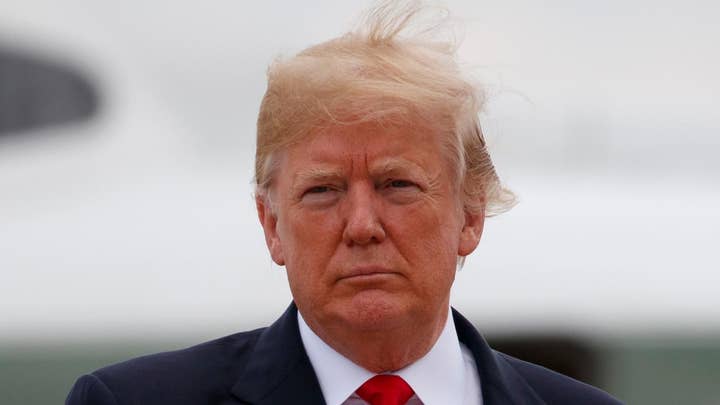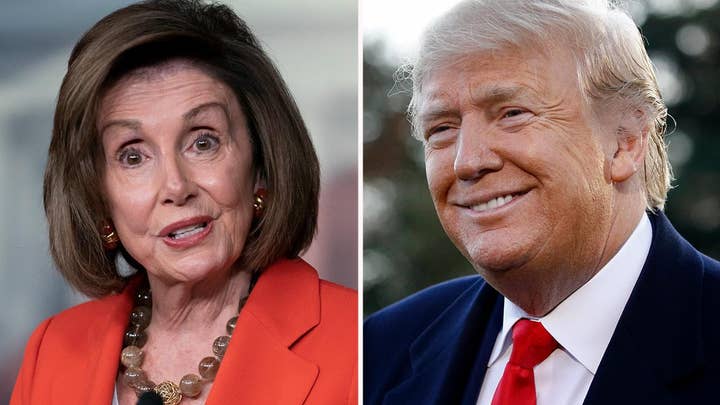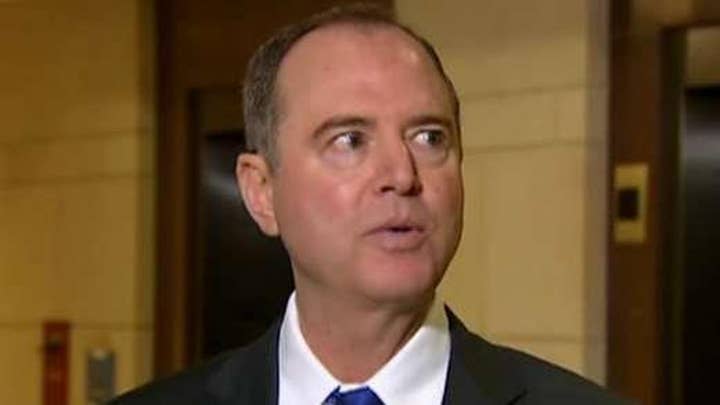House Republicans call on Nancy Pelosi to release impeachment transcripts
Reaction from Christal Hayes, Washington correspondent for USA Today.
“It’s not an impeachment resolution,” said House Speaker Nancy Pelosi, D-Calif.
Pelosi had just announced the House would, in fact, hold a vote to formalize the impeachment probe and establish parameters for the investigation late last month.
The House speaker had argued for weeks such a step wasn’t necessary. Congressional Republicans and members of the administration countered that the White House shouldn’t cooperate because the House never codified the inquiry.
“They would much rather discuss process,” House Intelligence Committee Chairman Adam Schiff, D-Calif., when asked about the GOP demand for a vote. “They can’t defend the president’s conduct.”
So, in mid-October, I asked Pelosi, “why not call the administration’s bluff?”
Pelosi was having none of it.
“Why?” replied an incredulous Pelosi. “Because we’re not here to call bluffs. We’re here to find the truth, to uphold the Constitution of the United States. This is not a game for us. This is deadly serious.”
When I followed up, Pelosi cut me off.
“We’re not going there,” Pelosi said of a prospective impeachment process vote.
Some moderate and conservative Democrats from battleground districts breathed a sigh of relief. Some have been skeptical of impeachment and would prefer to avoid the topic altogether. They’d rather discuss health care and infrastructure issues, maybe adoption of the United States–Mexico–Canada Agreement [USMCA] trade package.
These Democrats wouldn’t deny they may have to vote on impeaching President Trump. But, these lawmakers seemed to know the less they’d have to deal with impeachment, the better off they were. So, holding off on impeachment as long as they could was fine with them.
Pelosi then reversed course. She ordered up a vote to structure the impeachment inquest. At the time, lots of reporters wanted to know what Pelosi had in mind. So Rebecca Kaplan of CBS News simply asked the speaker to tell her “about the impeachment resolution.” That’s when Pelosi responded by saying it “wasn’t an impeachment resolution.”
To be fair, the resolution in question wasn’t to impeach the president of the United States. But, at that stage, the contours of the resolution were vague at best.
Pelosi announced plans to assemble a resolution in a “Dear Colleague” letter she sent to House Democrats on Oct. 28. In her missive, Pelosi said the resolution “affirms the ongoing, existing investigation that is currently being conducted by our committees as part of this impeachment inquiry.” A note at the end of the letter gave a brief description as to what the resolution would do: “Directing certain committees to continue their ongoing investigations as part of the existing House of Representatives inquiry into whether sufficient grounds exist for the House of Representatives to exercise its constitutional power to impeach Donald John Trump, president of the United States of America, and for other purposes.”
So, it’s easy to understand why people around the Capitol would colloquially refer to this as an “impeachment resolution” – even if it was far away from any actual articles of impeachment.
But therein lies the sensitivity about the resolution among Democrats and the potential toxicity surrounding the word “impeachment.”
Consider what transpired a day later at the weekly “pen and pad” briefing with House Majority Leader Steny Hoyer, D-Md. I intended to ask Hoyer about the possible collision course looming this fall on Capitol Hill: impeachment, an effort to approve the USMCA and the prospects for a government shutdown on Nov. 22.
“You’re moving an impeachment resolution in the House this week. You’re trying to move USMCA. Do you see kind of a...” I said, before Hoyer interrupted.
“We’re not moving an impeachment resolution this week,” he noted. The Maryland Democrat then said he hadn’t seen the resolution yet, adding, “We’ll see whether we’re going to schedule it.”
This flew in the face of Pelosi’s letter the day before. Still, Hoyer’s reaction signaled some vulnerability among Democrats on the issue.
“If it’s not an impeachment resolution, what is it?” I asked the majority leader. “And, what should it be called in the minds of the Democratic leadership?”
Hoyer responded to the interrogatory with a thick reply about the courts and Republicans demanding a vote to structure the impeachment process.
“I don’t know what an ‘impeachment resolution’ is,” Hoyer concluded.
I followed up.
“Isn’t it able to be called that in shorthand, though?”
“You know, we’ve gone around and around and around about this,” replied Hoyer. “We are having an inquiry looking at whether articles of impeachment are justified by the facts.”
I asked again.
“Are you reluctant to call it [an] ‘impeachment resolution’ because of the potential for the public to perceive this at this stage as impeaching the president, even though you’re obviously several steps short of that?” I asked.
“I want to be very careful in my verbiage because I’ve found it repeatedly misconstrued by those of you who either write the stories or the headlines,” said Hoyer. “I want to be very precise. We are continuing the process of determining whether ‘high crimes and misdemeanors’ have been committed by the president of the United States, which would justify, at that point in time, proceeding with articles of impeachment.”
ANDY PUZDER: THE IRONY OF IMPEACHMENT... LOOK HOW TRUMP POLICIES WORK FOR DEM VOTERS
A few days later, the House approved the resolution setting the ground rules for the current impeachment investigation.
It didn’t matter what that resolution was called or wasn’t called a few weeks ago. Congress has descended into impeachapalooza. There’s no quibbling about what’s consuming Capitol Hill. Some Democrats may fret about the political ramifications of impeachment. Leaders like Pelosi and Hoyer may try to parse words about impeachment, but we’re well past the point of no return now.
Impeachment is now the political equivalent of the Popeye’s chicken sandwich. Nothing commands as much attention.
Some Congressional Democrats have bragged about how they got only a handful of questions about impeachment at symposia and town-hall meetings back in their districts. That could well change with impeachment dominating everything. How would this go for Democrats representing battleground districts? Hard to say. They’ve finessed it so far, but the possibility of political danger has lurked around each corner for vulnerable Democrats.
Voters skunked House Democrats at the polls the last time they had the majority and devoted their time into a major issue: passage of ObamaCare. It’s unclear if impeachment could jeopardize Democrats this round.
Impeachment wouldn’t necessarily be a gift to Republicans, either. Congressional Republicans would have to explain any unbending defenses of Trump. Will their boilerplate approach attacking the process, attacking the whistleblower and ignoring some evidence regarding Trump and his team be sufficient? The approach may work in districts and states which have been “all in” for Trump, but that’s a hard sell if Republicans would try to widen the playing field.
With impeachment steamrolling other issues, Democrats have been trying to convince the public that other legislation was underway.
Hoyer distributed a “Dear Colleague” letter Friday, reminding members to expect work on renewing the Export-Import Bank and efforts to lower prescription drug costs.
“The House is continuing to do important work for the people, even as our committees continue the impeachment inquiry,” Hoyer said. “We can, and we will, continue to make progress on critical issues while upholding our Constitutional duty.”
Rep. Haley Stevens, D-Mich., flipped a district from red to blue last year, becoming the first Democrat to win that seat since the mid-1960s. Trump had carried the district by three points.
Stevens explained how the House was toiling on manufacturing measures and bills advancing technology and science in manufacturing.
Few have been hearing about manufacturing legislation right now. They’re hearing about impeachment.
CLICK HERE TO GET THE FOX NEWS APP
“Well, if all you’re doing is watching the cable news, [impeachment' seems like all we’re doing,” Stevens said.
Seems.
This would be why some Democrats have been concerned about impeachment. It’s such a powerful force, it’s muscled out everything else.
















































